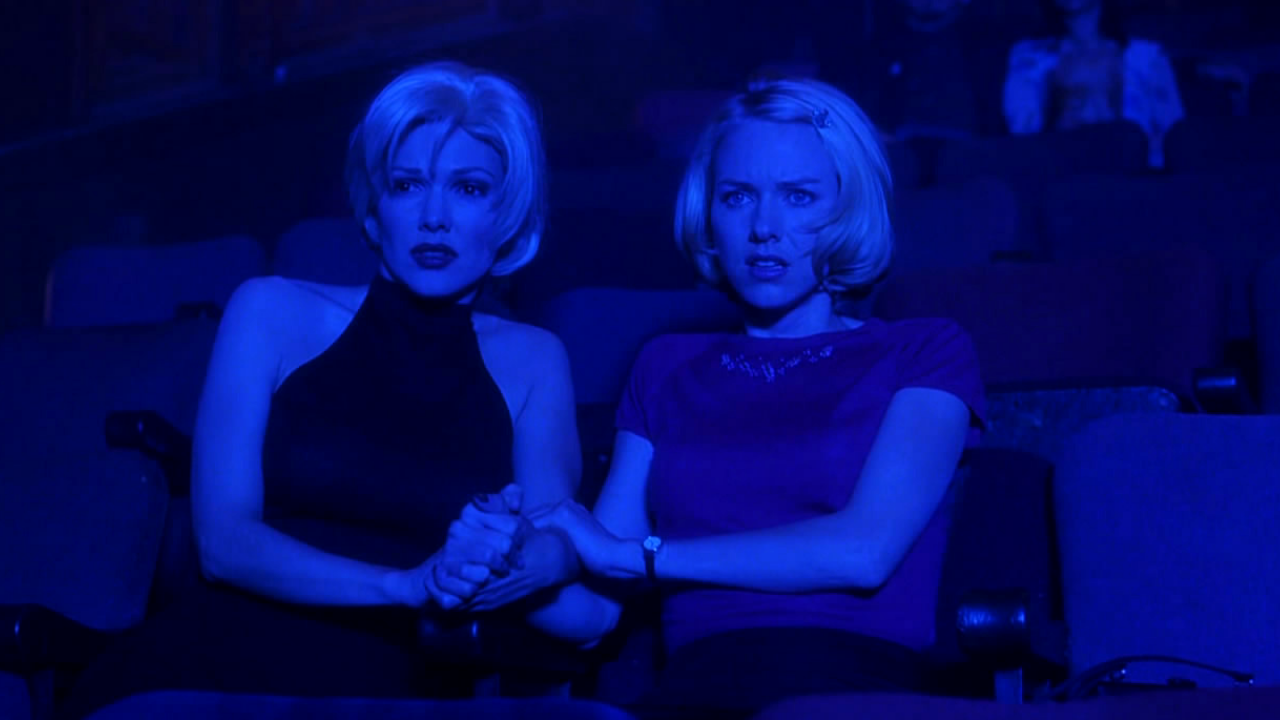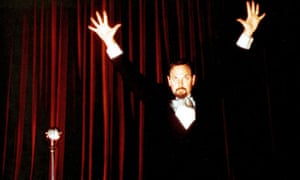This review is part of the Summer Under the Stars Blogathon sponsored by Journeys in Classic Film. Today's star is Ann Miller.
Does Mulholland Drive actually make sense? It is pretty indecipherable to many people, even acolytes to its writer/director David Lynch. If you go into Mulholland Drive expecting a film with a beginning, middle and end that tells a straightforward narrative, you may leave it in total disgust. Even going into it with some idea of the surreal nature of it all may not be enough to comprehend it. However, I fond that Mulholland Drive has logic within it: the logic of dreams, fitting for a film built around dreams metaphorical and literal.
A mysterious woman survives both an attempted assassination and a major car crash but suffers amnesia as a result. Sneaking her way into an apartment, she is discovered by Betty Elms (Naomi Watts), a cheerful aspiring actress just arrived from Deep River, Ontario whose aunt rents that apartment from eccentric Coco (Ann Miller). The mysterious woman calls herself "Rita" (Laura Elena Harring) from a Rita Hayworth poster, but she has no idea who she is, let alone what thousands of dollars or a blue key are for in her purse. Betty, just starting out her acting career, decides to help Rita uncover her mystery.
As they continue their investigation, Betty also has her acting career to take care of. She nails an audition, but there is nefarious work afoot. Hotshot director Adam Kesher (Justin Theroux) is being pressured to cast a Camilla Rhodes for his feature, The Sylvia North Story, told "This is the girl". Adam at first resists, but forces beyond his control get him to do as he's told. Eventually, Betty and Rita become lovers, and after a tryst Rita takes Betty to Club Silencio, where a strange stage show sends them both into fits of shaking and crying. Back at Betty's apartment, Rita opens a blue box Betty found in her purse with the blue key and both essentially disappear.
 At about the two-hour mark, things take a wild turn. We find ourselves now in perhaps reality or a dream, with the disheveled Diane Selwyn (Watts again). She's a bitter, angry woman, having lost her lover Camilla Rhodes (Harring again). Camilla is in a relationship with her director, Adam (Theroux again). At a Hollywood party on Mulholland Drive, Diane witnesses silently and angrily Camilla and Adam's relationship, while Adam's mother Coco (Miller again) is equally not amused. Diane hires a hitman to kill Camilla, the hitman telling her she's find a blue key when the job's done. There is a blue key at her apartment, but visions of crazed old people drive Diane to the brink and she shoots herself.
At about the two-hour mark, things take a wild turn. We find ourselves now in perhaps reality or a dream, with the disheveled Diane Selwyn (Watts again). She's a bitter, angry woman, having lost her lover Camilla Rhodes (Harring again). Camilla is in a relationship with her director, Adam (Theroux again). At a Hollywood party on Mulholland Drive, Diane witnesses silently and angrily Camilla and Adam's relationship, while Adam's mother Coco (Miller again) is equally not amused. Diane hires a hitman to kill Camilla, the hitman telling her she's find a blue key when the job's done. There is a blue key at her apartment, but visions of crazed old people drive Diane to the brink and she shoots herself.In the end, a woman seen at Club Silencio whispers "Silencio" (Silence).
Yes, trying to give a narrative overview to Mulholland Drive is a difficult thing because it has many elements. In this overview, I had to leave out subplots of Adam's marriage, seemingly random people discussing their own dreams, clumsy hitmen and figures coming and going with nary a sense of reality. So, what to make of Mulholland Drive?
I think it bears remembering that Mulholland Drive started out as a television pilot that was rejected. As such, I think David Lynch put in potential story threads that in the planned series might have tied together. Once the pilot was killed, Lynch reworked it into a feature film, giving it his usual surrealistic touches.
The general theory is that the first two-thirds of Mulholland Drive is Diane's dreams where she recasts those around her, including herself as the sweet, upbeat Betty who is destined for success versus the failed Diane. Diane failed at love and a film career, but "Betty" is on her way both professionally and personally, with "Rita" madly in love with her. I think this is as good a theory as possible to explain most of Mulholland Drive, with other elements (The Cowboy, the dark forces pushing Adam to say "This is the girl") being integrated from the hoped-for series.
That being said, I think Mulholland Drive is really about Diane, this lost angel in this City of Dreams. The film is about dreams, all kinds of dreams. It is about literal dreams where the most random things appear to make sense but wouldn't in reality. It is about metaphorical dreams: dreams of stardom, of love, of being able to change things for our better. It is about dark dreams, those desires carnal and murderous that we can live out safely within fantasy. As much as I can gather, Mulholland Drive is about how we can or do make our dreams come true, for good or ill.
In the Betty section, Betty herself marvels about how she is in this "dream place". A seemingly random section where a man discusses a recurring frightening dream to someone says "You're in both dreams, and you're scared". Dreams rarely make sense when we awaken but appear totally real and logical when we are in them. I think Mulholland Drive speaks to that idea of the unreal reality of dreams, extending it to aspirational dreams.
 Lynch extends this idea of unreal reality to the movies themselves. We accept the reality of the situation despite knowing, as the Club Silencio sequence openly declares, "No hay banda! (There is no band)". Everything is an illusion, the bizarre Master of Ceremonies declares, showing us how the "trumpet player" is mimicking playing but that it is a recording. It is all fake. The Betty/Rita story is fake. Betty herself is fake. Mulholland Drive itself is fake. It is all unreal, yet because we see it, we accept it as "real".
Lynch extends this idea of unreal reality to the movies themselves. We accept the reality of the situation despite knowing, as the Club Silencio sequence openly declares, "No hay banda! (There is no band)". Everything is an illusion, the bizarre Master of Ceremonies declares, showing us how the "trumpet player" is mimicking playing but that it is a recording. It is all fake. The Betty/Rita story is fake. Betty herself is fake. Mulholland Drive itself is fake. It is all unreal, yet because we see it, we accept it as "real".We see this brilliantly when we see what at first appears to be an argument between Betty and Rita. "You're still here?" Betty asks angrily. "I came back. I thought that's what you wanted," a somewhat puzzled Rita replies. "Nobody wants you here," Betty snaps. At first, we accept that there is some kind of falling out, but then Lynch pulls back the camera to show that Rita is merely reading lines from a script. Here, Lynch circumvents our original expectations and reveals that "it was an illusion". Our preconceived notions led us to one conclusion, but then more information changed it completely.
Later on, "Betty" delivers the same lines at the audition, differently, erotically, again revealing the unreality of acting. In those moments, the audience gets caught up in the performance it is soon forgotten that it is a performance. It becomes "real". I think Mulholland Drive was crafted to be Lynch's take on cinema: the falseness of it all both with what audiences are presented and what it takes to make one. Perhaps the "dark forces" pushing for a particular performer and crazed meetings were his subtle dig at studio interference?
Mulholland Drive was Naomi Watts' breakout role, and she is absolutely extraordinary in the dual roles. Even as Betty, we sense there is still something a bit off, something a bit too cheerful, upbeat and innocent. Her various transitions from the perky Betty to the sultry Betty in the audition to the bitter Diane show an exceptional range. Laura Elena Harring holds her own as Rita, this tormented and confused woman who shifts into the cold, selfish Camilla Rhodes. Theroux's Adam manages a wry humor when presented with odd situations but is able to show a slightly darker side when with "Camilla".
Curiously, I think Ann Miller in her final role has the most radical change. She is eccentric but caring with Betty, but dismissive and disinterested with Diane. While her role is small she makes the most of it, in turns almost endearing and slightly creepy.
Mulholland Drive should be seen as a dream and a meditation on dreams and film. I won't take away from people who think it might all be incomprehensible rubbish (I feel that way about Twin Peaks: Fire Walk with Me). Having seen Mulholland Drive again, I find that it is not as crazed or incomprehensible as I once thought.
The logic of dreams.
DECISION: A+


No comments:
Post a Comment
Views are always welcome, but I would ask that no vulgarity be used. Any posts that contain foul language or are bigoted in any way will not be posted.
Thank you.